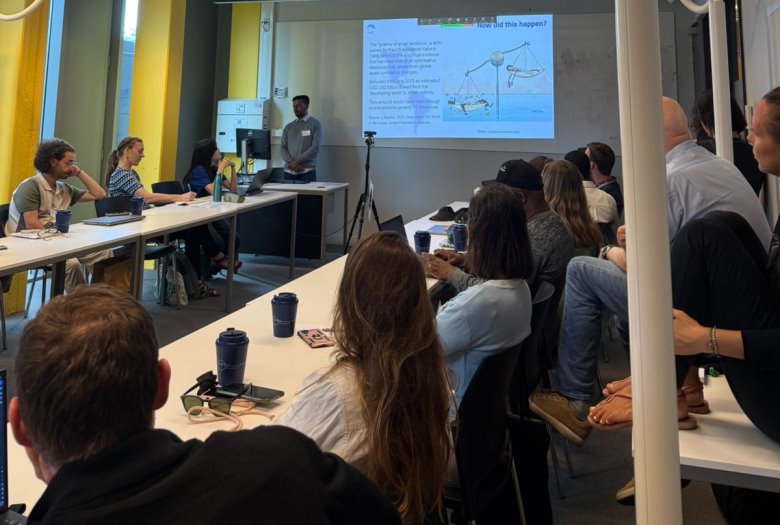This year’s conference ,convened from 24 to 27 June 2025 in Amsterdam, focused on the balance between tensions, trade-offs, and the potential transformations required for the future of sustainable marine resource management and governance, thriving coastal livelihoods and healthy, biodiverse oceans. The conference took place right after UNOC3 and in the middle of the Ocean decade (2020-2030). The organisers seized the opportunity to invite reflections on where we currently stand using the ‘People and the Sea’ lens and the tensions between climate change manifestations and the human activities which are shaping the health and functioning of the ocean and thus of our global wellbeing. Insights, resource access, impacts and capabilities are unevenly distributed resulting in tensions across social, economic, and political dimensions. What kind of transformation is most appropriate given that we can’t agree on ‘the ocean we want’?
The contribution by Mundus maris was crafted by Cornelia E Nauen and Stella A. Williams. It asked ‘Can small-scale success stories turn the tide?’ The presentation was kindly ensured by Ruyel Miah, a PhD candidate at the University of Waterloo, Canada.

Ruyel Miah presenting the paper by Nauen and Williams of Mundus maris
The ‘tyranny of small decisions’, a term coined by the American economist Kahn in 1966, refers to the empirical evidence that harmless individual optimisation decisions may create even global-scale cumulative changes of state as is observable with overfishing, biodiversity loss, and climate change. Here we show a number of success stories in small-scale fisheries and citizen initiatives in Europe and West Africa. These concern, e.g. coastal area protection by fishers in the Mediterranean, collaborations between coastal fisher organisations and environmental NGOs like Environmental Justice Foundation in Ghana and elsewhere in West Africa, a successful citizen petition against the trade of shark fins in Europe, advances of the Africa-wide women’s network AWFISHNET and promotion of female scientists through NiWARD. These will be spelled out in some detail to explore the hypothesis.
At heart, they are driven by the need to advance equity concerns which should be at the center of governance, implementation and monitoring, because inequity is currently the norm. Despite these encouraging efforts and local advances, at this point in time, the authors come to the conclusion that the examples provided do not yet scale sufficiently to turn the tide. As a result they argue in favour of much broader citizen movements across sectoral boundaries, e.g. involving small-scale fishers and farmers, the imperative of building stronger social organisations and seek the broadest alliances possible among currently disadvantaged socio-economic actors, scientists and civil society movements to enable structural and policy changes in favour of protecting the commons with cycles of monitoring and participatory governance. That can enable a just sharing of cost and benefits of urgently needed nature recovery in line with overdue advances in implementing the SDGs of Agenda 2030.
The slides with further reading are available here. We thank Ruyel Miah for his effective presentation. More information on the 2025 MARE Conference can be found at the conference website.
Accademia della Pesca Artigianale
- Pescatori artigianali e ambientalisti ripensano insieme la pesca
- Make Fishing Fair
- La pesca eccessiva straniera alimenta la mortale crisi migratoria del Senegal verso l’Europa
- Mundus maris at MARE 2025
- I pescatori artigianali al centro della governance dell’oceano e della sicurezza alimentare
- Make Fishing Fair in the EU, 25 March 2025
- Human – Biodiversity Relationships Across Scales
- World Fisheries Day, 21 November 2024, celebrated in Nigeria
- Mundus maris partecipa al 2024 World Fisheries Day organizzato dalla Canoe and Fishing Gear Association del Ghana (CaFGOAG).
- Mundus maris contribution to the UNOC3 public consultation
- Vertice sulla pesca artigianale a Roma, 5-7 luglio 2024
- Regional Symposium on European Small-Scale Fisheries, Larnaca, Cyprus, 1-3 July 2024
- Riunione di emergenza sulla pesca nel Baltico, Bruxelles, 26 giugno 2024
- Ambivalent role of Market and Technology in the Transitions from Vulnerability to Viability: Nexus in Senegal SSF
- Shell fisheries as stewardship for mangroves
- Edizione africana del 4WSFC a Cape Town, 21-23/11/22
- Giornata mondiale della pesca, 21 novembre 2023
- Webinar: Nigeria’s Fisheries challenges and opportunities
- Presentazione della FishBase app al Symposium di Tervuren
- Convegno MARE sulla paura blu – Mundus maris riflette
- The Transition From Vulnerability to Viability Through Illuminating Hidden Harvests, 26 May 2023
- Sessioni EGU focalizzate su geoetica e apprendimento congiunto
- Solidarietà con i pescatori artigianali in Senegal e Mauritania
- The legal instruments for the development of sustainable small-scale fisheries governance in Nigeria, 31 March 2023
- Tools for Gender Analysis: Understanding Vulnerability and Empowerment, 17 February 2023
- Community resilience: A framework for non-traditional field research, 27 January 2023
- Sustainability at scale – V2V November webinar
- Edizione Europea del 4WSFC in Malta, 12-14 Settembre 2022
- Mundus maris contribuisce all’SSF Summit in Roma
- Donne commercianti di pesce a Yoff e Hann in Senegal, vittime o artefici del loro destino?
- L’Accademia continua il suo lavoro a Yoff
- Illuminating the Hidden Harvest – a snapshot
- Virtual launch event FAO: International Year of Artisanal Fisheries and Aquaculture
- The Small-Scale Fisheries Academy as a source of operational support to PA Guidelines
- Congresso mondiale della pesca, Adelaide, 20-24 settembre
- Mundus maris sostiene la lotta di Paolo il pescatore, in Toscana, Italia
- Catching-up – SSF Academy Yoff, 27 Febr. 2021
- Rafforzare le capacità degli attori per una pesca sostenibile su piccola scala
- Sperimentazione dei metodi di formazione durante la fase pilota dell’Accademia SSF in Senegal
- Una prima assoluta: il lancio di un’Accademia della Pesca su Piccola Scala in Senegal
